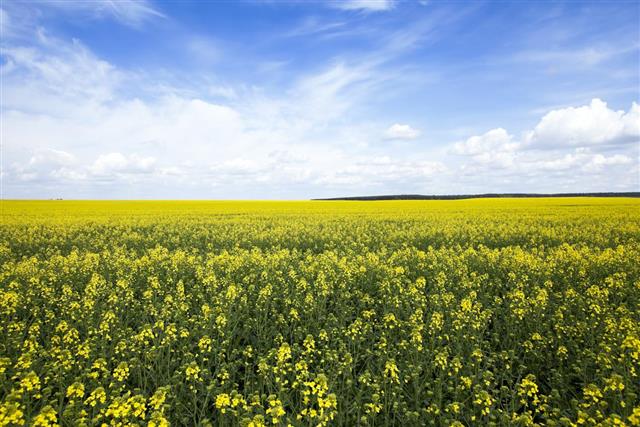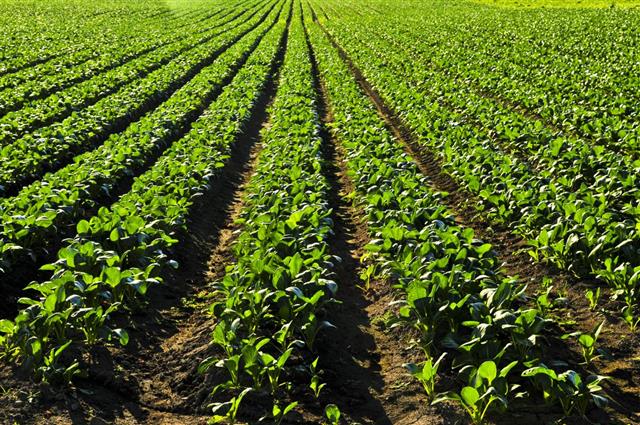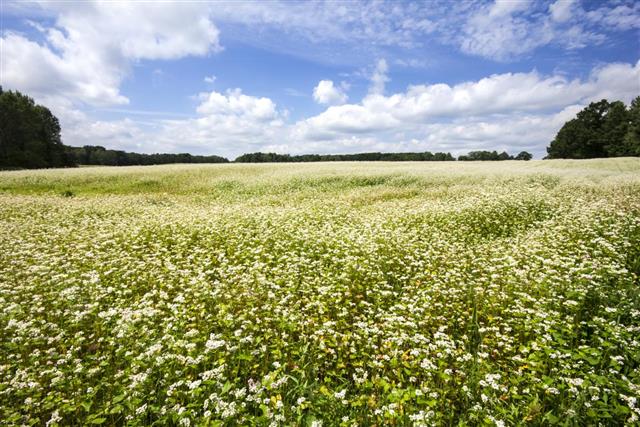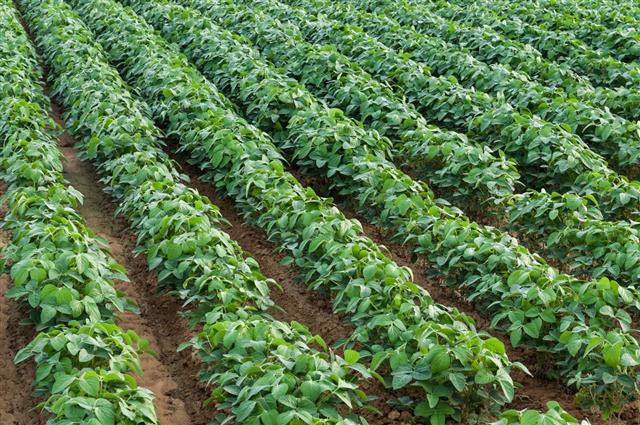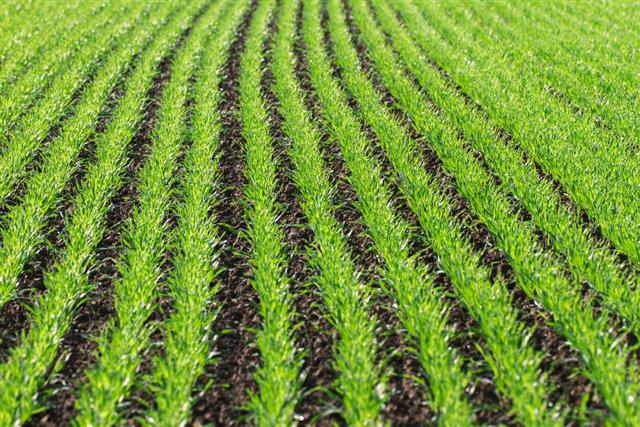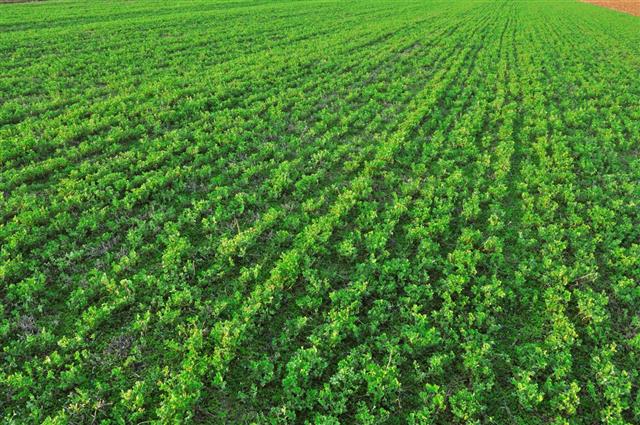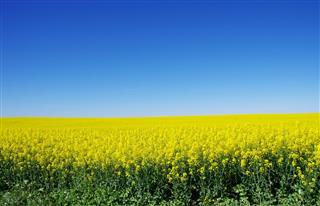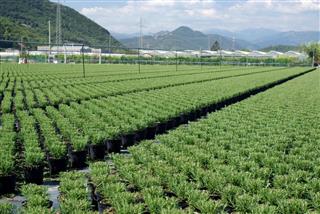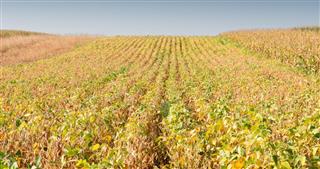
An agricultural practice which involves the cultivation of a single crop over a wide area for many successive years. It is practiced widely by farmers the world over. This Gardenerdy article weighs the advantages and disadvantages associated with monoculture farming.
An example of how monoculture can lead to disaster is the 1980s Grapevine calamity. California grape growers had to replant almost two million acres of vines, when their grape roots were severely affected by grape phylloxera (Daktulosphaira vitifoliae)―a new type of pests.
Monoculture farming is an agricultural method that involves planting one species of crop on the same piece of land repeatedly. Due to its implementation, farmers can yield large harvests with minimum utilization of resources. The ritual of growing the same crop for many successive years is known as crop monoculture. For example, in monoculture farming, rice will be grown only with rice, particular type of potato will be cultivated only with that type. In monoculture, same crop is grown in the same land year after year. The main purpose behind monoculture farming is to maximize the output and minimize labor required.
The term monoculture or this technique is not just restricted to agriculture, it can be applied in other fields too. For example, raising one particular type of livestock on a farm, also in the field of computer science, wherein a group of computers are running the same software. It is extensively used in the field of farming, but other than that, it is adopted in forestry too. Same species of trees are planted in a particular area.
Examples of monoculture crops include corn, wheat, rice, clover, cotton. It also includes tea, coffee, different types of fruits, and rubber trees. Experts are of the view that monoculture farming is more of a curse than boon, particularly after the Irish Potato Famine of 1845. Along with its added benefits over traditional farming, it comes with its own set of dangers and risks. Let us take a closer look at each of them.
Advantages of Monoculture
- This approach to farming is fairly simple in nature, focusing all its needs and preference on one single crop species. Farmers just need to prepare the soil, and irrigate the land based on one crop. With monoculture, the field is in a better position to provide maximum output for a particular crop.
- Harvesting becomes fairly easy as the desired parts of the plant can be easily assembled without damaging other plants, which would be very difficult in polyculture. Chemical treatments is feasible, pests and diseases can be treated without having to worry about their side effects on other plants.
- It helps to keep down farming costs down, Farmers yield more output in less resources. Makes management pretty easy, machines and various methods can be utilized more efficiently and systematically.
- The knowledge of single plant species is sufficient for a good crop, farmers need not worry about other species, their cultivation methods, disease prevention, etc. Since the emphasis is on one plant, acquiring adequate knowledge or expertise is also easy.
- It is convenient for home gardeners who want to have a bigger harvest of a particular plant; suppose they want to save up on corn or barley to reduce their expenses. Growing a single large crop requires less investment.
- By grouping different plants together, farmers or gardeners have to cater to the fertilizer requirement of different plants. But with monoculture, they can easily use and apply one common fertilizer for all the plants.
- Planting same species of crop is much easier and faster process. Farmers can prepare garden beds and seed plants altogether. They just need to prepare garden beds for only one type of crop.
- Controlling pests and disease becomes relatively easy. Growers just need to use one pesticide for all the plants, because the diseases affecting them would be common.
- There is less competition for sunlight, nutrients, and space from other species. It helps to control other undesirable growth. It helps to maximize profits by planting crops which yields high gross margin.
- High gross margin crops are market-driven, and it’s easy to market such crops. Farmers particularly plants crop which can be consumed all year round, and also those which will thrive under all weather conditions.
Disadvantages of Monoculture
- Monoculture does not support other flora and fauna. According to its definition, other plants should not be planted. We all need different environment to survive; likewise, animals continuously living in one environment will lack the feel of a natural habitat.
- If a particular disease or pest can affect one single plant, then it can possible affect all the other plants as they also will be vulnerable to their attack. An infected plant, in this scenario, will be surrounded by infected plants, which will lead to the destruction of the entire crop.
- Plants require multiple resources to thrive; however, if a crop is planted in the same field for extended periods, it limits its chance of taking advantage of other nutrients in the soil.
- One of the problems of monoculture farming is limited food options. For the sake of saving their resources, farmers plant one single crop, leaving consumers with few options to survive on, which can lead to malnutrition, especially in developing countries.
- Due to the cultivation of same crops over and over again, monoculture reduces the nitrogen composition in the soil. Once the land is used for one single crop, soil fertility diminishes at a faster rate.
- Because of diminishing soil fertility, farmers rely heavily on chemicals and technology to promote plant growth and production. Monoculture leads to environmental damage when the chemicals and pesticides make their way into ground water.
- Due to major crop failure, farmers can suffer high losses, which in turn would contribute to total market loss. Farmers depend on one type of production, so their income is also not stable.
- Monoculture results in less diversity of other species, this applies to both plants and animals. This, in turn is not good for the bio-diversity of that entire region.
- Monoculture is not advocated because repetitive use of fertilizers can lead to soil erosion, which makes it difficult for plants to grow.
- Planting crops over a large area can be time-consuming for a farmer. Not to mention the efforts and investment required to set up a complex irrigation system.
There won’t be any outcome if we simply sit and crib about the problems associated with monoculture farming. Solutions like polyculture, crop rotations, biotech crops might solve some issues, but again, there are some pros and cons related to them also. Researchers state that the trouble connected to monoculture farming is far more complex and grave to solve.
